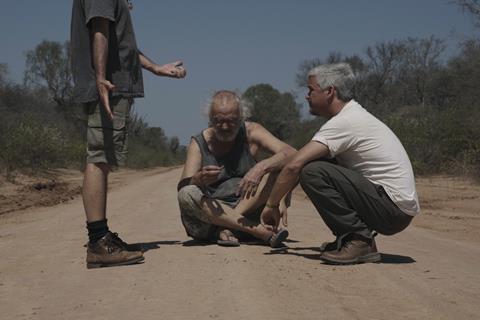Paraguayan filmmaker Sebastian Pena Escobar takes a personal trip to the country’s threatened forests

Dir/scr: Sebastian Pena Escobar. Paraguay/Uruguay/France. 2023. 89mins
Constructed around a road trip undertaken by three old friends, The Last develops into a lament for a disappearing Paraguay and a confrontation of the worst fears about the impact of climate change. Director Sebastian Pena Escobar brings a personal perspective to a range of environmental concerns in a documentary that should prove a perfect fit for specialist festivals.
A lament for a disappearing Paraguay
Escobar met his uncle, Paraguayan ornithologist Jota Escobar, and his friend, German entomologist Ulf Drechsel, at his aunt’s wake more than 20 years ago. The memory of that event is captured in still images and fond words of remembrance. Now, the trio are heading to the Gran Chaco region of Paraguay to visit vast forests that are under threat from cattle farming, drought and especially wildfires.
The tone of the film is established early on as we witness Drechsel’s ’bug wall’; a suspended green sheet, backlit by a naked bulb, that attracts night butterflies and countless insects. The camera lingers as they crawl and swarm, and Drechsel provides wry commentary on a species that eat their children first and then cease devouring them when they are old enough to work. His erudition and humour become hallmarks of a journey in which the trio struggle to find reasons for hope in the face of climate catastrophe.
The screen is filled with suitably apocalyptic imagery during the course of their trip. Overhead shots capture the desolation of bone dry fields, dusty back roads, smouldering, ash grey scrubland and blood red skies. There is little need to spell out what this means for the country. There are so many areas now in which nothing remains to nourish the earth. The absence of nutrients is accompanied by the loss of plants and wildlife and the slow destruction of the food chain. Tigers are now reported to be eating cattle as everything that once formed part of their traditional food supply has been lost in the fires; surviving trees have acquired the name of the ’doomed forests’. There is a constant refrain that time is not on the side of Paraguay’s forests.
Escobar brings a note of wistful longing to his narration as he recalls a childhood in which Paraguay was a country covered in forests, and contemplates how much has changed in the space of his lifetime. He calls himself ”a nostalgic voyeur of threatened forests” and describes his elderly, bedraggled travelling companions as “two wise environmentalists that look like members of a weird punk band.” Filming from the back seat of their vehicle, Escobar mostly remains out of sight while lobbing questions to the two men sitting in the front. He prompts discussions about system failures, the insanity of consumerism, pollution, technology and whether the human impact on the planet is irreversible.
The chit chat between Elf and Jota throws up some interesting insights, although there is a tendency towards rambling conversations that Escobar seems happy to indulge. Old-friends rehash familiar arguments, and Jota is rarely seen without a brew of yerba mate in his hand. Their good-natured banter and genial manner feel like a comfort blanket. As the skies turn darker shades of red, Paraguay begins to look as desolate as Mars and the eerie electronic soundscape of Ismael Pinkler’s score adds to the sense of impending doom.
The Last is an engaging, informative documentary that never allows itself to succumb to the despair that would seem the most appropriate response to what is revealed during their trip. At the end, however, the rains come and the devastating drought ends in a matter of hours. The earth can heal and repair – but whether humanity will be here to see it is a very different matter.
Production companies: La Babosa Cine, Bocacha Films, Mutante Cine, La Fabrica Nocturna Cinema
International sales: Bocacha Films info@bocachafilms.com
Producers: Marcelo Martinessi, Sebastian Pena Escobar, Agustina Chiarino, Fernando Epstein, Xavier Rocher, Marina Perales Marhenda
Cinematography: Pascual Glauser
Editing: Fernando Epstein
Music: Ismael Pinkler
























